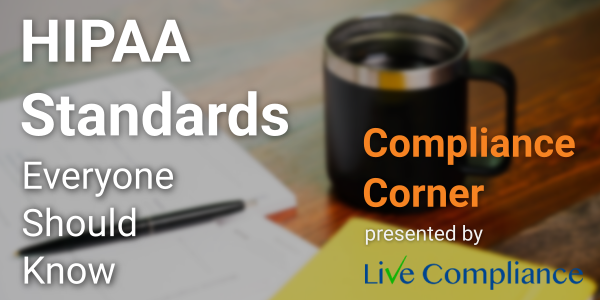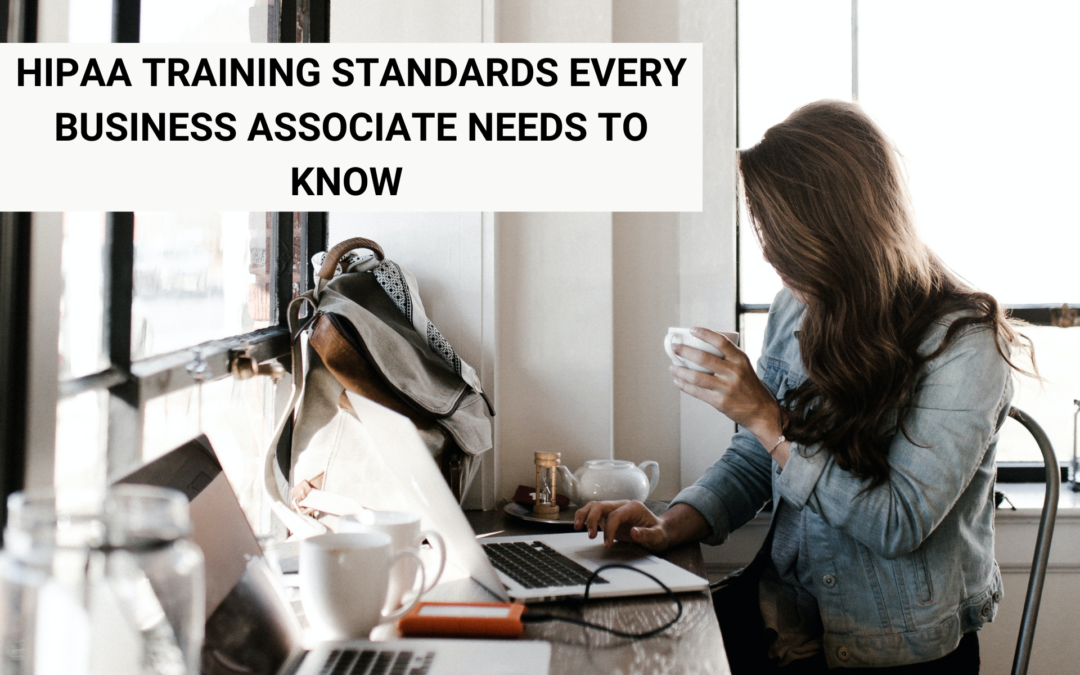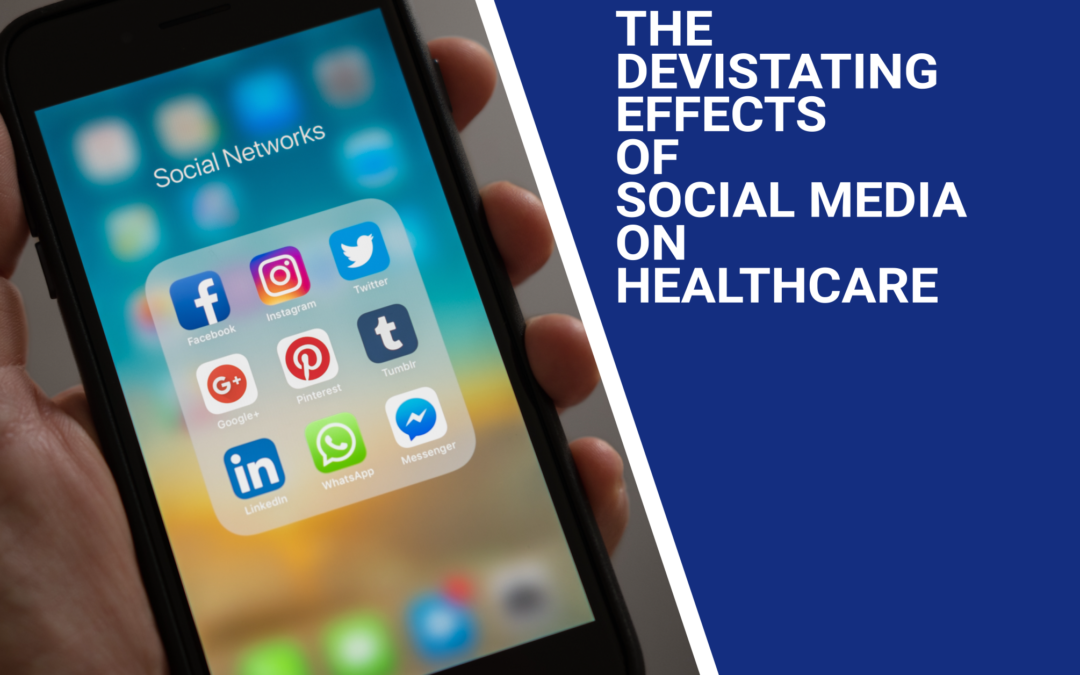
Aug 15, 2022 | Live Compliance, Partner
HIPAA Training Standards Every Business Associate Needs to Know
Per the HIPAA Privacy Rule and HIPAA Security Rule, both Covered Entities and Business Associates, must require HIPAA training for all workforce members that access protected health information (PHI) or electronically protected health information (e-PHI) in any of its forms and should be provided “as necessary and appropriate for the members of the workforce to carry out their functions within the [organization].”
According to the Rule, training must be provided “to each new member of the workforce within a reasonable period of time after the person joins the [organization’s] workforce.” Along with all other annual compliance requirements, HIPAA training is arguably the most important. Your workforce members are your first line of defense in the event of a Breach and must be able to identify your organization’s designated HIPAA Security Officer, and have a firm understanding of the HIPAA Privacy and Security Rule. Training should also highlight the organization’s Technical, Administrative, and Physical Safeguard objective security requirements. It is best practice to provide ongoing security awareness training and, in addition to the mandatory annual training, the Privacy Rule also highlights what’s known as “periodic” training. The goal is to ensure workforce members’ knowledge of HIPAA compliance is not forgotten.
It’s advisable that HIPAA training is given to all employees as new hires during the new employee orientation period, and before new employees are exposed to or work with individually identifiable health information. This includes officers, agents, employees, temporary employees; like students, interns, volunteers, and salespeople. At a minimum, training should cover the basics of HIPAA, the basics of privacy and security requirements and restrictions, and policies and procedures. All new hires need to be provided HIPAA training and a post-test on the material covered within the training course to ensure comprehension of relevant and appropriate HIPAA policies and procedures. Security Officers should be trained on the Breach Notification Rule, Minimum Necessary Rule, and the Organization’s policies and procedures.
The HIPAA Privacy Rule states that “An [organization] must document that the training as described [in the HIPAA Text] has been provided.” Failing to do so will be seen as “willful neglect” and will result in HIPAA violations including monetary penalties as high as $1.5 million dollars. A minor violation may only result in a corrective action plan requirement, whereas a significant data breach attributable to a lack of training will be viewed more seriously.
At Live Compliance, we make checking off your compliance requirements extremely simple.
-
-
- Completely online, our role-based courses make training easy for remote or in-office employees.
- Short informative video training to meet periodic training requirements
- Depending on the size of your organization training may start as low as $79
Call us at (980) 999-1585 or visit us online at www.LiveCompliance.com/ezclaim
ABOUT EZCLAIM:
EZClaim is a leading medical billing, scheduling, and payment software provider that combines a best-in-class product with exceptional service and support. For more information, schedule a consultation today, email our experts, or call at 877.650.0904.

Sep 21, 2021 | Live Compliance, Partner
Per the HIPAA Privacy Rule and HIPAA Security Rule, both Covered Entities and Business Associates, must require HIPAA training for all workforce members that access protected health information (PHI) or electronically protected health information (e-PHI) in any of its forms and should be provided “as necessary and appropriate for the members of the workforce to carry out their functions within the [organization].”
According to the Rule, training must be provided “to each new member of the workforce within a reasonable period of time after the person joins the covered entity’s workforce.” Along with all other annual compliance requirements, HIPAA training is arguably the most important. Your workforce members are your first line of defense in the event of a Breach and must be able to identify your organization’s designated HIPAA Security Officer, and have a firm understanding of the HIPAA Privacy and Security Rule. Training should also highlight the organization’s Technical, Administrative, and Physical Safeguard objective security requirements. It is best practice to provide ongoing security awareness training and, in addition to the mandatory annual training, the Privacy Rule also highlights what’s known as “periodic” training. The goal is to ensure workforce member’s knowledge of HIPAA compliance is not forgotten.
The HIPAA Privacy Rule states that “An [organization] must document that the training as described [in the HIPAA Text] has been provided.” Failing to do so will be seen as “willful neglect” and will result in HIPAA violations including monetary penalties as high as $1.5 million dollars. A minor violation may only result in a corrective action plan requirement, whereas a significant data breach attributable to a lack of training will be viewed more seriously.
At Live Compliance, we make checking off your compliance requirements extremely simple.
-
-
- Completely online, our role-based courses make training easy for remote or in-office employees.
- Short informative video trainings to meet periodic training requirements
- Contact-free, accurate Security Risk Assessments are conducted remotely. All devices are thoroughly analyzed regardless of location. Conducting an accurate and thorough Security Risk Assessment is not only required but is a useful tool to expose potential vulnerabilities, including those such as Password Protection.
- Policies and Procedures are curated to fit your organization ensuring employees are updated on all Workstation Use and Security Safeguards in the office, or out. Update in real-time.
- Electronic, prepared document sending and signing to employees and business associates.
Call us at (980) 999-1585 or visit www.LiveCompliance.com.
ABOUT EZCLAIM:
As a medical billing expert, EZClaim can help the medical practice improve its revenues since it is a medical billing and scheduling software company. EZClaim provides a best-in-class product, with correspondingly exceptional service and support. Combined, EZClaim helps improve medical billing revenues. To learn more, visit EZClaim’s website, email them, or call them today at 877.650.0904.

Aug 19, 2021 | Partner
Designing a Superior Patient Experience
We live in a world of increasingly lofty consumer expectations—one where 44% of U.S. consumers will switch to a competitor following a poor customer service experience.
The medical industry is no exception to this trend.
In a study by PatientPop, 58 percent of Gen Z, Millennials, and Gen Xers, as well as 63 percent of individuals 55 and older, said that responsiveness to follow-up questions via email or phone outside of the appointment is critical or very important to overall satisfaction.
Patients want more than just excellent care from their healthcare providers. They expect easy access to medical records, convenient online scheduling and appointment reminders, prompt responsiveness, and painless ways to contact your office—24/7/365. And they’re also seeking compassionate and knowledgeable representatives who are willing to provide caring and accurate resolutions to their issues.
As a medical provider, you should not only focus on bringing in new patients but also continually strive to improve patient retention. Growth in customer retention rates by 5 percent can increase profitability anywhere from 25 to 95 percent, after all.
So how do you design an experience that increases patient satisfaction and retention? Let’s dive in.
1: Make Prompt Call Answering & Convenient Appointment Scheduling A Priority
As we mention above, patients want—and nowadays expect—your office to answer quickly as well as provide effective and swift resolutions to their health matters. But in a busy office, the staff is often focused on dealing with patients. Even front desk and administrative teams can become inundated with in-office tasks at a busy practice, leaving calls, messages, and emails unanswered.
A superior patient experience starts with prompt call answering and convenient appointment scheduling—a service that’s available to your patients whenever they need you, including weekends and holidays, and answers every call addresses delicate patient concerns with empathy, and schedules appointments quickly. If your staff is struggling to keep up with demand, consider outsourcing your phone answering and appointment scheduling. Not only will this improve patient satisfaction, but it also brings a sense of work-life balance to internal staff and allows you and your team to focus on what you do best; caring for patients.
2: Streamline and Perfect Your Patient Intake Process
The patient intake process is tedious, but it’s incredibly important to your operations, and speed and accuracy are vital. Streamlining and perfecting patient intake starts with leveraging the right software—one that makes it easy for patients to fill in their information and access their records, and provides all of the valuable data your practice needs to operate in an easy-to-navigate platform. For starters, your intake software should:
- Be encrypted for data transfer through the internet and HIPAA compliant
- Be intuitive and user-friendly
- Not require special software or hardware downloads or installation for the user
- Be portable into back-end systems
Your intake process should also be integrated with your electronic health records (EHR) software, and information should be updated and available in real-time for a smooth experience—for patients, admin staff, and providers—so that everyone is up-to-speed. Both technology and your process should remove redundancies from your workflow and streamline the intake experience.
3: Provide HIPAA-Compliant Live Chat & Text For Swift and Convenient Communication
Another great way to improve patient experience is via live chat and text, through which you and your staff can communicate with patients wherever they are, send appointment reminders, have two-way private and secure conversations, multitask as needed and be available when emergencies happen.
HIPAA-compliant chat and text messaging lets you communicate efficiently and accurately with patients and simultaneously safeguards electronically protected health information (PHI) while taking full advantage of the speed and flexibility of today’s communication technology.
Some of the many benefits of secure live chat and text in the healthcare realm include:
- Reduced response times, including in the off-hours and on weekends or holidays
- Ability to provide immediate recommendations for care and preliminary diagnoses
- Ability to send follow-ups, like reminding patients to take medications, which creates better relationships between you and your patients
- Secure PHI storage that acts as a record of past conversations, symptoms, or complaints to improve future care, diagnosis, and treatment plans
4: Leverage Technology and Software Integrations For Smarter Decision-Making
Technology and software integrations have transformed healthcare and are vital in any medical practice. Why? Because when you streamline your office functions and workflows, you improve all aspects of patient care and experience.
First, your office should be using an EHR (electronic health record) system. This system automates access to client information, helping to improve workflows and reduce incidences of errors by improving the accuracy and clarity of medical records. It should include all the key clinical data relevant to each patient’s care, including:
- Demographics
- Progress notes
- Problems
- Medications
- Vital signs
- Past medical history
- Immunizations
- Laboratory data
- Radiology reports
Communication data collected throughout your patients’ experience with your office—such as phone conversations, appointment scheduling, and reminders, and live chat and text transcripts—should also be sent to and recorded in your EHR system.
Finally, the right software can help you make better patient and business decisions. For instance, maybe you want to know the percentage of patient calls versus the percentage of calls from hospitals that come into your office. Or, maybe you want to know which hospitals call you the most or you want to know the main reasons patients call so you can use that information to improve patient care and education.
How The Highest-Performing Medical Practices Prioritize Patient Experience
Medical practices that provide a superior service experience are available to their patients 24/7, have a streamlined and accurate intake process, are tech-forward, and have omnichannel communication options that empower patients to reach out any time and from anywhere. But most medical practices don’t do it all on their own. The highest-performing medical providers leverage an outside service provider like Nexa to improve client satisfaction, increase retention and grow their revenue. Learn more about how Nexa can help your medical practice level up by visiting nexa.com/medical.
ABOUT EZCLAIM:
As a medical billing expert, EZClaim can help the medical practice improve its revenues since it is a medical billing and scheduling software company. EZClaim provides a best-in-class product, with correspondingly exceptional service and support. Combined, EZClaim helps improve medical billing revenues. To learn more, visit EZClaim’s website, email them, or call them today at 877.650.0904.
[ Contribution from the marketing team at Nexa ]

Jul 27, 2021 | HIPAA, Live Compliance, Partner
HIPAA Social Media Do’s and Don’ts in Healthcare
There are many benefits to social media in the healthcare industry, however, there is also huge potential for HIPAA violations of patient privacy to be violated on social media networks. The Privacy Rule protects All “individually identifiable health information” held or transmitted by a covered entity or its business associate, in any form or media, whether electronic, paper or oral. The Privacy Rule calls this information “protected health information (PHI).”
Did you know that more than 71% of recorded data breaches in the healthcare industry are attributable to employee actions?
The most important rule is to never share Protected Health Information or Personally Identifiable Information on social media. Social media may include personal blogs and other websites, including Facebook, LinkedIn, Twitter, YouTube, or others of the like.
A few common identifiers include but are not limited to:
-
- demographic data
- medical histories
- test results
- insurance information
- and other information used to identify a patient or provide healthcare services or healthcare coverage.
What is a breach and what can I do to avoid it?
A breach is, generally, an impermissible use or disclosure under the Privacy Rule that compromises the security or privacy of the protected health information. This means employees should refrain from posting, commenting, or sharing patient information on social media including patient names, photos, and descriptors that would identify the patient.
What is considered identifiable information?
The most common social media HIPAA violations include:
-
- Posting of images and videos of patients without written consent
- Posting of gossip about patients
- Posting of any information that could allow an individual to be identified
- Sharing of photographs or images taken inside a healthcare facility in which patients or PHI are visible
- Sharing of photos, videos, or text on social media platforms within a private group
“Friending” patients on social media websites is also strongly discouraged. This can lead to accidental identifying of patients, especially if your place of work is listed in your profile and accidental ‘discussion’ about the patient’s care. Therefore, employees in inpatient care roles generally should not initiate or accept friend requests. Do not enter into social media discussions with patients who have disclosed PHI on social media.
Employees should also refrain from messaging or texting PHI or PII on social media or messaging applications not approved by your organization. In general, no personally identifiable health information should be sent in any manner which does not ensure communication encryption in transit and at rest.
So, what do you do if you think you may have exposed a patient’s protected health information or personally identifiable information?
In general, it’s advised to, follow your organization’s Incident Response Policy immediately and notify your supervisor and/or designated HIPAA Security Officer for immediate next steps.
At Live Compliance, we make checking off your compliance requirements extremely simple.
-
- Reliable and Effective Compliance
- Completely online, our role-based courses make training easy for remote or in-office employees.
- Contact-free, accurate Security Risk Assessments are conducted remotely. All devices are thoroughly analyzed regardless of location. Conducting an accurate and thorough Security Risk Assessment is not only required but is a useful tool to expose potential vulnerabilities.
- Policies and Procedures are curated to fit your organization ensuring employees are updated on all Workstation Use and Security Safeguards in the office, or out. Update in real-time.
- Electronic, prepared document sending and signing to employees and business associates.
Don’t risk your company’s future, especially when we are offering a free Organization Assessment to help determine your company’s status. Call us at (980) 999-1585, or email me, Jim Johnson at Jim@LiveCompliance.com or visit www.LiveCompliance.com
For more information about DarkWeb breaches please contact us at (980) 999-1585 or email us at support@livecompliance.com
ABOUT EZCLAIM:
As a medical billing expert, EZClaim can help the medical practice improve its revenues since it is a medical billing and scheduling software company. EZClaim provides a best-in-class product, with correspondingly exceptional service and support. Combined, EZClaim helps improve medical billing revenues. To learn more, visit EZClaim’s website, email them, or call them today at 877.650.0904.

Nov 10, 2020 | Administrative Safeguards, HIPAA, Live Compliance, Medical Billing Software Blog
The noncompliance of HIPAA security rules has had huge consequences for an IT and health information management company.
CHSPSC LLC, (“CHSPSC”) has agreed to pay over $2 million to the Office for Civil Rights (OCR) at the U.S. Department of Health and Human Services (HHS), for the breach of Protected Health Information (PHI). The Business Associate was notified by the Federal Bureau of Investigation (FBI) that it had traced a cyber-hacking group’s advanced persistent threat into CHSPSC’s information system.
After OCR ‘s investigation, it was found that CHSPSC had “longstanding, systemic noncompliance with the HIPAA Security Rule including failure to conduct a risk analysis, and failures to implement information system activity review, security incident procedures, and access controls.” The large health system provided various Business Associate services, including IT and health information management, to hospitals and physician clinics. These violations could have easily been avoided! OCR Director Roger Severino said, “The healthcare industry is a known target for hackers and cyber-thieves. The failure to implement the security protections required by the HIPAA Rules, especially after being notified by the FBI of a potential breach, is inexcusable.”
In addition to the monetary penalty, the Business Associate will be required to complete a “robust” Corrective Action Plan (CAP) with monitoring activity for at least the next two years. CHSPSC will also be required to do the following:
• Implement technical policies and procedures to allow access only to those persons or software programs that have been granted access rights to information systems maintained
• Implement procedures to regularly review records of information system activity, such as audit logs, access reports, and security incident tracking reports
• Conduct accurate and thorough assessments of the potential risks and vulnerabilities to the confidentiality, integrity, and availability of ePHI
All this shows that ANYONE can face HUGE penalties, and they would most likely bankrupt a small billing company or an independent physician practice.
So, based on this specific example, it is VERY important to understand that every complaint or potential breach must be investigated by HHS/OCR. If you, a billing company, or other vendor, suspect a breach, you must inform the covered entity (your client) and have a breach risk assessment completed to determine key factors and take action.
Keep in mind, a Business Associate is a ‘person’ or ‘entity’. This means that ALL billing companies—large or small—need to comply with the Federal HIPAA security rules and regulations. So, if your company has not completed an accurate and thorough security risk assessment, there is a possibility that you could be penalized under ‘willful neglect’. (This category alone gas a fine of $50,000 per violation!)
So then, what can be done to ensure this doesn’t happen to my billing company or my organization? Well, one of EZClaim’s partners, Live Compliance, can make determining your compliance requirements extremely simple:
• Completely online, Life Compliance’s role-based courses make training easy for remote or in-office employees
• Contact-free, accurate Security Risk Assessments are conducted remotely. All devices are thoroughly analyzed regardless of location.
• Policies and procedures are curated to fit your organization, ensuring employees are updated on all workstation use and security safeguards in or out of the office. Update is in real time.
• Electronic, prepared document sending and signing to employees and business associates
So, don’t risk your company’s future, especially when Life Compliance is offering a FREE Organization Assessment to help determine your company’s status. Either call Life Compliance at 980.999.1585, visit LiveCompliance.com to schedule an assessment, or e-mail Jim Johnson.
[ Article contributed by Jim Johnson of Live Compliance ]
———————————-
ABOUT EZCLAIM:
EZClaim is a medical billing and scheduling software company that provides a best-in-class product, with correspondingly exceptional service and support, and can help improve medical billing revenues. To learn more, visit their website, e-mail them at sales@ezclaim.com, or call a representative today at 877.650.0904.






